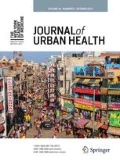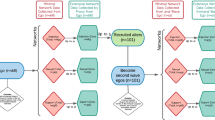Abstract
Community characteristics have been associated with racial and ethnic health disparities for a wide range of ailments and conditions. Previous research has found that rates of AIDS cases among injection drug users (IDUs) vary by community characteristics. However, few studies have examined whether community characteristics are associated with HIV risk behaviors among IDUs. To address this gap in the literature, we examined the associations between census-tract-level community characteristics and injection-related and sex-related HIV risk behaviors among IDUs in the San Francisco Bay Area. Individual HIV risk behaviors were collected from 4,956 IDUs between 1998 and 2002. Using 2000 US census data, we constructed four census-level community measures: percent African American, percent male unemployment, percent of households that receive public assistance, and median household income. All community variables were measured continuously. Multilevel modeling was used to determine if community characteristics were associated with recent (in the last 6 months) receptive and distributive syringe sharing, multiple sex partners, and unprotected sex risk while controlling for potential individual-level confounders. In bivariate analysis, most of the census-tract-level community characteristics were significantly associated with injection-related HIV risk, while no community characteristics were associated with sex-related risk. However, results from multivariate multilevel models indicate that only percent African American in a census tract was associated with receptive [adjusted odds ratio (AOR) = 0.93; 95% confidence interval (CI) = 0.89, 0.99] and distributive syringe sharing (AOR = 0.94; 95% CI = 0.92, 0.99), net of individual-level characteristics. Accounting for individual-level factors in the multivariate model in the sex-related risk models revealed a significant inverse relationship between percent African American and propensity to engage in unprotected sex (AOR = 0.95; 95% CI = 0.92, 0.99); community-level characteristics remained unassociated with multiple sex partners. In this exploratory analysis, percent African American in a census tract was inversely associated with injection-related risk. The census-tract-level community characteristics we examined seem to exert little influence on individual risk among long-term chronic IDUs. More research is needed examining the influence of other community characteristics that were unmeasured in this paper but might be related to sex and drug risk among IDUs such as shooting galleries, crack houses, drug markets, and availability of preventive HIV services.
Similar content being viewed by others
Notes
To account for potential differences between cities (San Francisco, Richmond, and Oakland), we also ran models with city dummies at level-1. We found no substantive differences in the results and, subsequently, present results from models without city dummies.
References
Boardman JD, Finch BK, Ellison CG, Williams D, Jackson J. Neighborhood disadvantage, stress, and drug use among adults. J Health Soc Behav. 2001;42(2):151–165.
Galea S, Nandai A, Vlahov D. The social epidemiology of substance abuse. Epidemiol Rev. 2004;26:36–52.
Lillie-Blanton M, Anthony JC, Schuster CR. Probing the meaning of racial/ethnic group comparisons in crack cocaine smoking. JAMA. 1993;269:993–997.
Poundstone KE, Strathdee SA, Celentano DD. The social epidemiology of human immunodeficiency virus/acquired immunodeficiency syndrome. Epidemiol Rev. 2004;26:22–35.
Bluthenthal RN, Watters JK. Multimethod research: From targeted sampling to HIV risk behaviors. In: Lambert EY, Ashery RS, Needle RH, eds. Qualitative Methods in the Prevention of Drug Abuse and HIV Research, vol 157. Rockville, MD: National Institute on Drug Abuse; 1995:212–230.
Lampinen TM, Joo E, Seweryn S, Hershow RC, Wiebel W. HIV seropositivity in community-recruited and drug treatment samples of injecting drug users. AIDS. 1992;6:123–126.
Friedman SR, Lieb S, Tempalski B, et al. HIV among injection drug users in large US metropolitan areas, 1998. J Urban Health. 2005;85:434–445.
Friedman SR, Lynch J, Perlis T, Des Jarlais DC. Economic inequality, poverty, and laws against syringe access as predictors of metropolitan area rates of drug injection and HIV infection. Paper presented at: Global Research Network on HIV Prevention in Drug-using Populations, Third Annual Meeting, Durban, South Africa, July 2000.
Friedman SR, Perlis T, Des Jarlais DC. Laws prohibiting over-the-counter syringe sales to injection drug users: Relations to population density, HIV prevalence, and HIV incidence. Am J Public Health. 2001;91:791–793.
Bluthenthal RN. Race, Poverty, and Disease: HIV/AIDS Among African American Injection Drug Users in the San Francisco Bay Area. Dissertation, Berkeley: University of California; 1998.
Buchanan D, Shaw S, Teng W, Hiser P, Singer M. Neighborhood differences in patterns of syringe access, use, and discard among injection drug users: implications for HIV outreach and prevention education. J Urban Health. 2003;80(3):438–454.
Latkin C, Williams CT, Wang J, Curry AD. Neighborhood social disorder as a determinant of drug injection behaviors: A structural equation modeling approach. Health Psychol. 2005;24(1):96–100.
Wang J, Siegal HA, Falck RS, Carlson RG. Needle transfer among injection drug users: A multilevel analysis. Am J Drug Alcohol Abuse. 1998;24(2):225–237.
Caetano R. Alcohol-related heath disparities and treatment-related epidemiological findings among Whites, Blacks, and Hispanics in the United States. Alcohol Clin Exp Res. 2003;27(8):1337–1339.
Binswanger IA, Kral AH, Bluthenthal RN, Rybold D, Edlin BR. Abscesses and cellulitis among injection drug users in San Francisco. Clin Infect Dis. 2000;30:579–581.
Kral AH, Lorvick J, Gee L, et al. Trends in human immunodeficiency virus seroincidence among street-recruited injection drug users in San Francisco, 1987–1998. Am J Epidemiol. 2003;157(10):915–922.
Lorvick J, Kral AH, Seal K, Gee G, Edlin BR. Prevalence and duration of hepatitis C among injection drug users in San Francisco, Calif. Am J Public Health. 2001;91(1):46–47.
Lorvick J, Thompson S, Edlin BR, Kral AH, Lifson AR, Watters JK. Incentives and accessibility: A pilot study to promote adherence to TB prophylaxis in a high-risk community. J Urban Health. 1999;76(4):461–467.
Seal K, Kral AH, Gee L, et al. Predictors of non-fatal overdose among street-recruited injection drug users in the San Francisco Bay Area, 1998–1999. Am J Public Health. 2001;91(11):1842–1846.
Seal K, Kral AH, Lorvick J, McNees A, Gee L, Edlin BR. A randomized controlled trial of monetary incentives vs. outreach to enhance adherence to the hepatitis B vaccine series among injection drug users. Drug Alcohol Depend. 2003;71:127–131.
Watters JK, Estilo MJ, Clark GL, Lorvick J. Syringe and needle exchange as HIV/AIDS prevention for injection drug users. JAMA. 1994;271:115–120.
Watters JK, Downing M, Case P, Lorvick J, Cheng YT, Fergusson B. AIDS prevention for intravenous drug users in the community: Street-based education and risk behavior. Am J Community Psychol. 1990;18(4):587–596.
Watters JK, Biernacki P. Targeted sampling: Options for the study of hidden populations. Soc Probl. 1989;36:416–430.
Ricketts ER, Sawhill IV. Defining and measuring the underclass. J Policy Anal Manage. 1988;7:321–322.
Anderson JE, Chandra A, Mosher WD. HIV testing in the United States, 2002. Adv Data. 2005(363):1–32.
Ebrahim SH, Anderson JE, Weidle P, Purcell DW. Race/ethnic disparities in HIV testing and knowledge about treatment for HIV/AIDS: United States, 2001. AIDS Patient Care STDS. 2004;18(1):27–33.
Miller LG, Simon PA, Miller ME, Long A, Yu EI, Asch SM. High-risk seuxal behavior in Los Angeles: Who receives testing for HIV? J Acquir Immune Defic Syndr. 1999;22(5):490–497.
Taylor SL, Leibowitz A, Simon PA, Grusky O. ZIP code correlates of HIV-testing: A multi-level analysis in Los Angeles. AIDS Behav. 2006;10(5):579–586.
Anderson JE, Wilson R, Doll L, Jones TS, Barker P. Condom use and HIV risk behaviors among U.S. adults: Data from a national survey. Fam Plann Perspect. 1999;31(1):24–28.
Bluthenthal RN, Estilo MJ, Seeberg DM, Watters JK. HIV-1 infection and drug injectors in Oakland/Richmond, California. Paper presented at: Ninth International Conference on AIDS, Berlin, Germany, 6–11 June 1993.
Kral AH, Bluthenthal RN, Booth RE, Watters JK. HIV seroprevalence among street-recruited injecting drug and crack cocaine users in 16 U.S. municipalities. Am J Public Health. 1998;88:108–113.
Watters JK, Bluthenthal RN, Kral AH. HIV seroprevalence in injection drug users [letter]. JAMA. 1995;273:1178.
Holtgrave DR, Thomas CW, Chen H, Edlavitch S, Pinkerton SD, Fleming P. HIV prevention community planning and communities of color: Do resources track the epidemic? AIDS Public Policy J. 2000;15(2):75–81.
CDC. Methamphetamine use and HIV risk behaviors among heterosexual men—preliminary results from five northern California counties, December 2001–November 2003. MMWR Morb Mortal Wkly Rep. 2006;55(10):273–277.
Lorvick J, Martinez A, Gee L, Kral AH. Sexual and injection risk among women who inject methamphetamine in San Francisco. J Urban Health. 2006;83(3):467–505.
Molitor F, Ruiz JD, Flynn N, Mikanda JN, Sun RK, Anderson R. Methamphetamine use and sexual and injection risk behaviors among out-of-treatment injection drug users. Am J Drug Alcohol Abuse. 1999;25:475–493.
Semple SJ, Patterson TL, Grant I. The context of sexual risk behavior among heterosexual methamphetamine users. Addict Behav. 2004;29(4):807–810.
Dowling-Guyer S, Johnson ME, Fisher DG, et al. Reliability of drug users’ self-reported HIV risk behaviors and validity of self-reported recent drug use. Assessment. 1994;1:383–392.
Needle RN, Fisher DG, Weatherby N, et al. Reliability of self-reported HIV risk behaviors of drug users. Psychol Addict Behav. 1995;9:242–250.
Weatherby N, Needle RH, Cesari H, et al. Validity of self-reported drug use among injection drug users recruited through street outreach. Eval Program Plann. 1994;17:347–355.
Curtis R, Friedman SR, Neaigus A, Jose B, Goldstein M, Idefonso G. Street level drug market structure and HIV risk. Soc Netw. 1995;17:219–228.
Friedman SR, Furst RT, Jose B, et al. Drug scene roles and HIV risk. Addiction. 1998;93:1403–1416.
Sampson RJ, Raudenbush SW. Systematic social observation of public spaces: A new look at disorder in urban neighborhoods. Am J Sociol. 1999;105(3):603–651.
Burris S, Blankenship KM, Donoghoe M, et al. Addressing the “risk environment” for injection drug users: The mysterious case of the missing cop. Milbank Q. 2004;82(1):125–156.
Friedman SR, Cooper HL, Tempalski B, et al. Relationship of deterrence and law enforcement to drug-related harms among drug injectors in US metropolitan areas. AIDS. 2006;20(1):93–99.
Rhodes T, Mikhailova L, Sarange A, et al. Situational factors influencing drug injecting, risk reduction and syringe exchange in Togliatti City, Russian Federation: A qualitative study of micro risk environment. Soc Sci Med. 2003;57:39–54.
Wood E, Spittal PM, Small W, et al. Displacement of Canada’s largest public illicit drug market in response to a police crackdown. Can Med Assoc J. 2004;170(10):1551–1556.
Diez Roux, AV. Investigating neighborhood and area effects on health. Am J Public Health. 2001;91(11):1783–1789.
Rhodes T, Singer M, Bourgois P, Friedman SR, Strathdee SA. The social structural production of HIV risk among injecting drug users. Soc Sci Med. 2005;61(5):1026–1044.
Acknowledgments
Funding for this project was provided by the National Institute on Drug Abuse (grant #R01DA14210), the San Francisco Department of Public Health, and the Substance Abuse and Mental Health Services Administration. Support for D. Phuong Do was provided by the Kellogg Health Scholars Program.
Author information
Authors and Affiliations
Corresponding author
Rights and permissions
About this article
Cite this article
Bluthenthal, R.N., Do, D.P., Finch, B. et al. Community Characteristics Associated with HIV Risk among Injection Drug Users in the San Francisco Bay Area: A Multilevel Analysis. J Urban Health 84, 653–666 (2007). https://doi.org/10.1007/s11524-007-9213-3
Received:
Accepted:
Published:
Issue Date:
DOI: https://doi.org/10.1007/s11524-007-9213-3




